
JULIA LEE BARCLAY-MORTON – YOGA, WATER AND REWRITING AUTISM
I interviewed writer Julia Lee Barclay-Morton about her experience of autism. Julia began as an experimental dramatist in New York, moving to the UK to
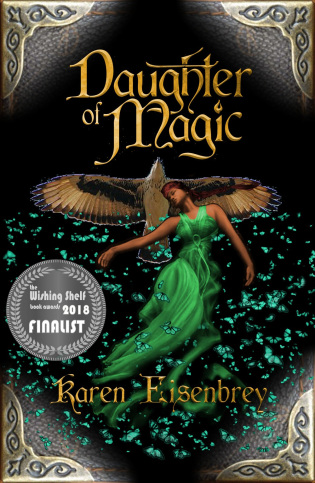
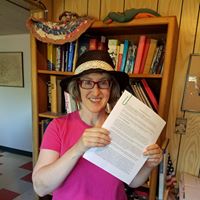
I talked to Karen Eisenbrey who, in her own words: “Writes fantasy and science fiction novels, as well as short fiction in a variety of genres and the occasional poem if it insists.” Karen also sings in a church choir, plays drums in a garage band, and wrote songs for her debut YA novel The Gospel According to St. Rage , a finalist for the 2016 Wishing Shelf Book Awards .
Leslie: Starting from childhood, how did you develop as a writer?
Karen: I always loved stories: being read to, hearing people tell about when they were kids, then learning to read myself. I think it hit me in about 3rd grade that I really enjoyed writing made-up stories, and that everything I read had been written by somebody. Mind blown! Writing assignments were among my favorite kinds of schoolwork, but I don’t think it occurred to me until I was 16 or so that, duh, if I wanted to write a story, I could write a story, even if it wasn’t an assignment. That’s also when I began to think I might like to be a novelist, if rock star didn’t work out. (Spoiler: it didn’t.) I majored in English in college and played it pretty safe in my writing classes. It seemed like my classmates had much more interesting ideas for their stories, but I assumed I would figure it out later.
Leslie: How did your upbringing give you imaginative stimulus within an apparently ‘ordinary’ environment?
Karen: I grew up a preacher’s kid in a very small, mostly conservative rural community in the ’60s and ’70s. My folks were comparatively liberal for the time and place. We always had a wide variety of books in the house: kids’ books, comics, adult fiction and non-fiction, humor, theology, encyclopaedias, etc., plus whatever we found in the bookmobile or school library. The general rule was ‘You may read anything you can read’. Same for music: classical, folk, musical theater, and sacred albums were always available, and then my brother added rock to the mix. There was only one stereo, so everyone heard everything. My parents were smart, educated, and curious, as were my older siblings, which led to lively discussions of anything and everything. I mostly listened when I was younger, but I remember being about 10 and thinking, ‘Other families don’t talk like this. We’re more interesting’. It’s still true.
Leslie: Why did you have ‘nothing to say’ till you were 30? Can you flesh out the detail, please, of your remark about a wizard dream setting you off at 30.
Karen: My college writing was safe and not that interesting. I couldn’t get the hang of short stories, so I tried writing a novel. I actually finished it, but it was pretty blah. My next attempt wasn’t even worth a second draft. When I wasn’t hit by any better ideas, I set the whole plan aside. I was working full time, newly married, getting on with my grown-up life. I did write a series of goofy picture books, each one with progressively fewer words. They were far more creative and interesting than either of my bad practice novels, and funnier, but too odd to be published. I ran off copies and gave them to friends, who still remember them 30+ years later. Then kids came along and my job got more demanding. Writing was set aside again. In the thick of the chaos years, I was hit with an overwhelming, visceral need to write… something. Not with a story or even an idea for one, just the raw need. I started poking around with any tiny idea I could come up with. A few months into this, I had the opportunity to quit my job and stay home, which I jumped at. I pretended it was for the kids, but it was mostly for me. I wrote during naps, then during preschool, then during half-day kindergarten, churning out false starts, fan fiction, a few original stories, and one more bad practice novel. And one night I had a brief, vivid dream featuring 2 wizards and at least 3 plot twists. I remembered it when I woke up and knew the basics of the story that didn’t make it into the actual dream, enough to know this was a scene near the end. I started trying to write the book, just discovering it as I went. It took about a year to get to a readable draft. It wasn’t very good, but interesting enough to keep working at. I lost count of how many times I’ve rewritten and revised that initial story. It isn’t published (yet) but established the world and characters of my Daughter of Magic trilogy. I had to write 4 books just for my main character to be conceived!
Leslie: How would you describe your published books so far to someone unfamiliar with your writing? What do you bring to YA fiction and adult short stories that is adapted from your own life?
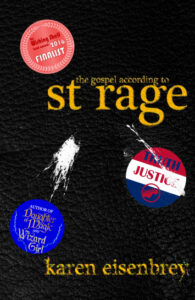
Karen: I have two active YA series going right now: The St. Rage books (The Gospel According to St. Rage and Barbara and the Rage Brigade) are hopepunk urban fantasy set in contemporary Seattle, a garage-rock/superhero mashup that grew out of my musical tastes, my love of hats and band names, my heart for social justice, and a mini-storage sign with a burned out O. It all began with a short story about a teen girl who is so withdrawn, she’s invisible until she starts wearing a hat and can suddenly be seen. She’s a lot like me.
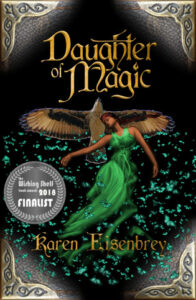
The Daughter of Magic trilogy (Daughter of Magic, Wizard Girl, and Death’s Midwife (coming in 2021)) is unapologetically feminist high fantasy with a setting based on the climate and geography of my beloved Pacific Northwest. It grew out of my frustration with the sameness of so much MG and YA fantasy. I thought, what if you had magic but no kings, no battles, no monsters (other than humans), and no fetch quests? Could that be interesting? It’s full of themes of friendship, making mistakes, redeeming mistakes, and using power for the right reasons.
I have contributed short fiction to something like 12 anthologies now. In a few cases, I submitted pieces I already had sitting around, but most of the time, I’m drawn to the theme and take it as a challenge to come up with something that fits. If nothing else, it’s a good exercise and motivation to submit work. Almost all of my work ends up offering a positive message of hope and standing up to oppression and domination systems, usually with humor and friendship.
Leslie: What external disciplines/constraints have helped and hindered you as a writer?
Karen: I’ve found that I don’t do well with writing prompts than demand immediate response or that come thick and fast. I just shut down. I need to take my time to process. Given that, I take word limits and set topics as a challenge, especially if I can turn it on its head somehow. I have been lucky not to experience much overly negative feedback, and have a thick enough skin to appreciate and learn from feedback that is blunt but on point. I don’t know how many times I’ve disagreed with feedback but agreed that the scene needed work, so have come up with a third way that is better all around. I’m always suspicious when an editor doesn’t want to change much! I love detailed but open-ended feedback, where it’s very clear about why there is an issue but allows me to find my own way to a solution. I also relish feedback that points me toward a breakthrough that I couldn’t get to on my own.
Leslie: You have been/are active in the Seattle music scene. What’s the history of this? How has music been a part of your soul? How has it fed into your writing?
Karen: I grew up in a musical household and have sung since I could talk. When I was about 12, my brother started borrowing records from his friends and I fell in love with rock and roll from the ’60s, ’70s punk, ’80s New Wave, etc. This became our thing. I was learning to play drums and he played piano, so we would try to play together. It didn’t work very well but it was fun. One summer when we were both home, he finally learned to play guitar and we were a living room band until we had to go back to college. But we didn’t get to play out in public until just a few years ago. (I started playing rock shows in bars when I was nearly 50! How cool is that?) He had tried starting a band with a rotating cast of other players but no one could commit. He asked me, finally, and we played as a duo called Your Mother Should Know from late 2011 through 2019, sometimes amplified, sometimes acoustic. We even recorded an album, and followed up with a few singles.
During this same time, I was writing a weekly blog about band names. I comb through the club listings, pick 5 band names that speak to me, and respond to them in a post. Those two experiences are responsible for most of the St. Rage phenomenon! Or all of it; my brother is a comic book fan from way back, so the superhero aspect was heavily influenced by that. He wrote most of our songs until I started writing the St. Rage stories, which feature a songwriter. Song titles turned into lyrics, then we added music, and ended up recording all eleven St. Rage songs.
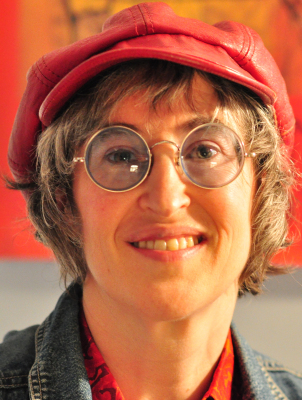
Leslie: What’s the difference between how you work on your writing and on a piece of music? What routines/quirks/habits help you while you’re composing?
Karen: When I’m writing fiction, I’m a ‘plantser’: I do some sketchy planning up front, then start writing, discovering most of the story as I go by the seat of my pants. I work on it alone, an hour or so a day, for however long it takes to finish it to the point where I’m willing to show it to other people. (This can be putting words into a document, but also includes spinning ideas while I’m walking or before I fall asleep.) Then I take the readers’ feedback and spend several months revising to get things just right. I’m pretty picky about my own stories.
Song lyrics tend to happen all at once, usually while walking, then get typed out and polished. I’m not particularly prolific, but songs seem to come in bunches. I don’t stress over them too hard. They can be as quirky as they want to be. I have come up with only 2 tunes on my own, so usually at that point, I hand over the finished lyrics and ask for help with the music part of it. I don’t play anything but drums, so any recording or performance also requires help.
Leslie: What are the different personae you have explored as a creative person? In the end, where do you locate your authentic self?
Karen: Ooh, interesting question…
—Out-loud Reader: Reading out loud can be extremely creative, bringing the written text to life. I got into this when I was a pre-teen but really hit my stride reading middle-grade novels to my kids. It has served me well at author readings.
—Author: There’s more to this role than just writing the book. Once it is published, you have to promote it, in everything from written interviews like this one or recorded podcasts to bookstore events and panel discussions. At first, I found it easy to get up and read but hard to talk about my work in a less scripted way. I’ve improved a lot from paying attention to how other authors do it. It’s easier if I think of it as playing the role of The Author rather than showing up as just me.
—Singer: I have sung in church (choir and solo) since I was a kid, and have added rock and roll more recently. Although less true now, I have generally been more comfortable singing than speaking in public. I enjoy performing more than socializing, too. Bringing The Author and The Singer together has been loads of fun!
My authentic self wears a lot of hats: I’m a liberal feminist Christian artist mom; a social-justice bard using humor, story, and song to resist evil and oppression and redeem the world.
Next week I talk to author Peter Street about his extreme experiences as a gravedigger and talented, autistic poet.
ABOUT LESLIE TATE’S BOOKS:

I interviewed writer Julia Lee Barclay-Morton about her experience of autism. Julia began as an experimental dramatist in New York, moving to the UK to

I interviewed Gillean McDougall from Glasgow, who edited the collaborative projects Honest Error (on Charles Rennie Mackintosh and his wife Margaret Macdonald) and Writing the

I interviewed French writer Delphine de Vigan, whose book, No et moi, won the prestigious Prix des libraires. Other books of hers have won a clutch

I interviewed Joanne Limburg whose poetry collection Feminismo was shortlisted for the Forward Prize for Best First Collection; another collection, Paraphernalia, was a Poetry Book Society Recommendation. Joanne

I interviewed Katherine Magnoli about The Adventures of KatGirl, her book about a wheelchair heroine, and Katherine’s journey from low self-esteem into authorial/radio success and
| Cookie | Duration | Description |
|---|---|---|
| cookielawinfo-checkbox-analytics | 11 months | This cookie is set by GDPR Cookie Consent plugin. The cookie is used to store the user consent for the cookies in the category "Analytics". |
| cookielawinfo-checkbox-functional | 11 months | The cookie is set by GDPR cookie consent to record the user consent for the cookies in the category "Functional". |
| cookielawinfo-checkbox-necessary | 11 months | This cookie is set by GDPR Cookie Consent plugin. The cookies is used to store the user consent for the cookies in the category "Necessary". |
| cookielawinfo-checkbox-others | 11 months | This cookie is set by GDPR Cookie Consent plugin. The cookie is used to store the user consent for the cookies in the category "Other. |
| cookielawinfo-checkbox-performance | 11 months | This cookie is set by GDPR Cookie Consent plugin. The cookie is used to store the user consent for the cookies in the category "Performance". |
| viewed_cookie_policy | 11 months | The cookie is set by the GDPR Cookie Consent plugin and is used to store whether or not user has consented to the use of cookies. It does not store any personal data. |
3 responses
I love reading about how people write and came to be writers, Leslie. My parents had a similar philosophy on reading “if you can read it, then you may read it.” I passed that on to my own sons.
Great interview! I’m a huge fan of Karen’s work (and, full disclosure, her friend and publisher), and I learned something I didn’t know about her!
Thank you! It’s great when a publisher is also a friend. As an author myself I appreciate a supportive relationship. Respect.